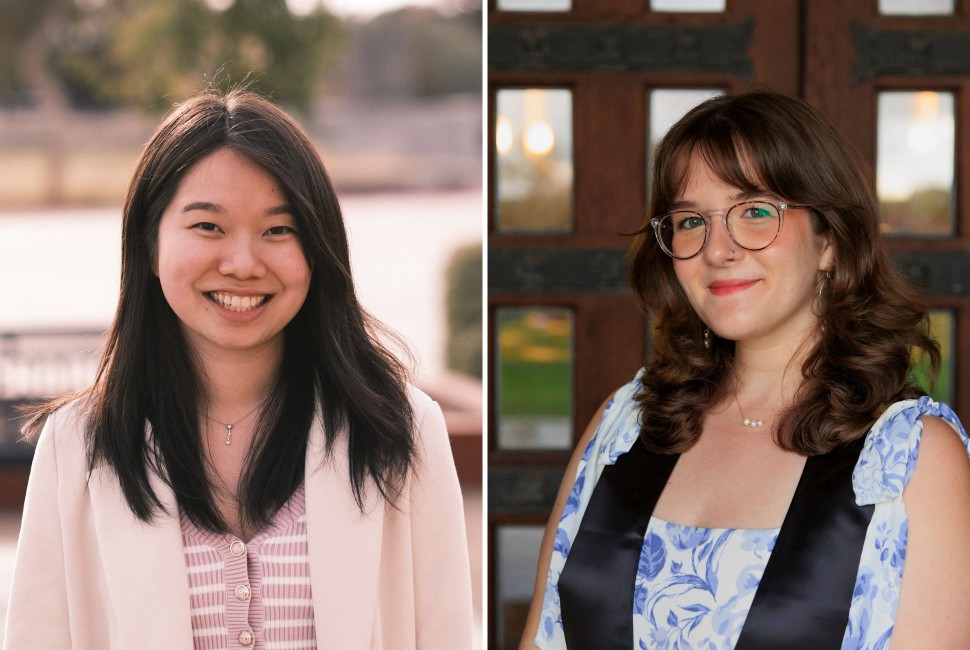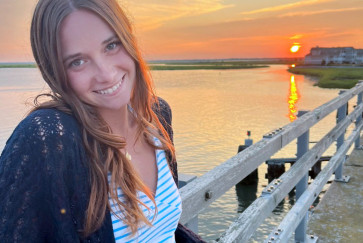Jane Clarke ’24 and Rachel C. Zhang ’24 MS have received 2025 Gates Cambridge Scholarships.
Now celebrating its 25th year, the program identifies academically outstanding social leaders to pursue postgraduate study and research at the University of Cambridge. Established in 2000 through a donation from the Bill and Melinda Gates Foundation, it has awarded 2,218 scholarships to scholars from 112 countries who represent nearly 800 universities.
Clarke and Zhang join an anniversary cohort of 95 scholars from around the globe. Including this year’s honorees, 20 Wildcats have been named Gates Cambridge Scholars.
“Our Gates Cambridge scholars have gone on to illustrious roles in the public and private sectors,” said Elizabeth Lewis Pardoe, director of the Office of Fellowships. “Jane and Rachel join Wildcats working at the leading edge of knowledge as intellectuals, advocates and entrepreneurs.
“All Gates Cambridge scholars share a commitment to improving the lives of others. Jane’s scrutiny of the lessons children take from literature and Rachel’s drive to harness machine learning for human benefit align perfectly with their predecessors’ achievements and the Gates Foundation’s goals.”
Meet this year’s scholars:
Jane Clarke
Clarke, who studied history and American studies in Northwestern’s Weinberg College of Arts and Sciences, will pursue a master of philosophy in American history at Cambridge.
There, she will build on her undergraduate thesis project, which examined ideologies of imperialism in American children’s literature in the first half of the 20th century. She plans to explore what is distinctive about how American imperialism is depicted by adding a comparison with British children’s literature from the same period.
While global history and the study of empire tend to focus on the big-picture or diplomatic level, Clarke’s project focuses on these topics through the lens of pop culture and ordinary people.
Ultimately, her goal is to become a historian in a public-facing setting, which is why she was drawn to the Gates Cambridge program.
“It combined my interest both in doing the academic research and how that research can make an impact outside of the academy on the lives of everyday people,” she said.
Though she didn’t enter Northwestern as a history major, Clarke became one after realizing how her understanding of history had fundamentally shaped how she interacted with the world. Now, she hopes sharing her own work can help spark others’ curiosity, something she saw firsthand in both her work with the Northwestern Prison Education Program and when she presented at the department of American studies’ senior research symposium.
“To see how that research, when it was presented to a wider public audience, could spark conversations, help people think more critically about the world around them, ask really interesting questions — that’s the importance of doing research for me,” she said.
Rachel C. Zhang
Zhang, who completed a masters in astronomy in Northwestern’s Weinberg College, will pursue a Ph.D. in applied mathematics and theoretical physics at Cambridge.
Starting in high school, Zhang became fascinated with how physics could explain everything from the trajectory of the ball during a ping-pong match with her dad to the movements of celestial bodies lightyears away.
Originally, she planned to complete a Ph.D. in astronomy, but she chose to pivot after a research internship where she got her first experience working with machine learning. During the experience, she was struck by how little is understood about how machine learning works.
“We have so many models, not only just in the field of natural language processing but also in various scientific fields,” Zhang said. “I think it is a little daunting to not be able to just break down exactly why these models work the way they do.”
During her Ph.D., she plans to focus on the field of interpretability, which seeks to “break down the black box” of machine learning to understand how models, particularly those used in scientific research, reach conclusions.
“If you can interpret and understand how these models work, know exactly why they made the decisions they did, then machine learning becomes a more practical and transparent tool that scientists can use effectively,” she said.
Zhang hopes to continue to do interdisciplinary work that draws on her background in astrophysics and her new focus on interpretability, and she is looking forward to the potential for creative cross-pollination with the diverse interests of this year’s cohort of scholars.
“It is just incredible how so many cool research projects are going on,” she said. “With interpretability, it could also be applicable to all these other fields. [I’m excited to] meet with them and maybe collaborate.”
Northwestern students interested in pursuing scholarship and fellowship opportunities can contact the Office of Fellowships to learn more.


